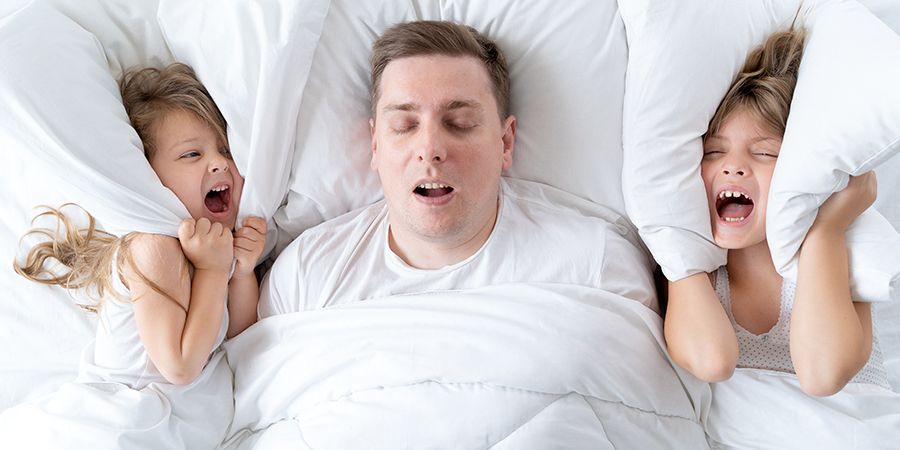We have all at some time heard someone snoring or have been the one who has snored, and they have told us about it the next morning.
Snoring is a high-pitched, unpleasant sound produced in the nose and throat while we sleep. It is a very common condition in our society, especially in older and overweight men. But it also affects women and even children.
As well as being annoying for the person next to you, snoring affects the person who suffers from it. Snoring can lead to not sleeping soundly and even waking up because of the annoying sound, throat discomfort, tiredness and fatigue when waking up.
Snoring can occur occasionally, caused by something specific, such as drinking alcohol, constipation or sleeping on your back.
Or, on the other hand, they may occur on a regular basis. In this case, it is necessary to see why they occur and whether they have a negative impact on health. It could be a case of sleep apnoea.
What causes snoring?
There are various causes of snoring. Here is a list of them:
- Obesity: Suffering from obesity or being overweight is one of the main causes, as fatty tissues obstruct the throat, making breathing difficult and causing snoring.
- Low throat and neck muscles: Lack of exercise also influences the throat and neck muscles by weakening them. If this happens, it causes the tongue to fall backwards, which partly blocks the airway.
- Age: Although there are children who snore, it is true that adults are more likely to snore. Forty percent of adults in our country snore.
- Pregnancy: During pregnancy there are women who start to snore, when they had never done so before, due to weight gain.
- Tonsils or adenoids (vegetations): There are people who have developed larger tonsils or adenoids by birth, and this makes them snore more easily.
- Soft palate or uvula: As in the previous case, if you are born with a long soft palate or uvula, you may snore.
- Nasal congestion: Whether due to allergy, cold or flu, nasal congestion blocks the entry of air through the nose, and only the mouth is used for breathing, causing snoring when sleeping.
- Alcohol: Alcohol acts as a sedative in our body, relaxing the muscles of the throat and neck, which causes snoring.
- Smoking: Smoking inflames the throat and dries out the airways, which causes snoring.
- Sleeping on the back: This is the position in which the airways can most easily close due to the position of the head.
Now that we know what the cause may be, let’s move on to the solution.
Can you stop snoring?
You can take steps that will help reduce snoring or even eliminate it.
- Exercise. As mentioned above, keeping your body (and neck and throat) strong is essential to avoid snoring.
- Keep your weight in check. Being overweight is the most common variable in people who snore. You will also take care of your health.
- Avoid alcohol at night. Drinking alcohol causes the throat muscles to relax at night, making snoring more likely.
- No smoking. Smoking irritates the airways and makes breathing more difficult, thus making snoring more likely. If we compare people who snore, smokers are almost twice as likely to snore as non-smokers.
- Avoid large dinners. Eating too much and just before going to bed can lead to snoring.
- Sleep on your side or in a reclining position. Both positions favour breathing and therefore help to prevent snoring.
- Decongest the nose. When you suffer from a cold or allergy, the airways become blocked. They should be cleaned before going to sleep with a salt water rinse, otherwise the chances of snoring will be very high.
- Avoid tranquilisers or antihistamines at night. Snoring is sometimes a side effect of such treatments. Take this into account.
- Keep the room clean, free of dust mites. Dust mites are the cause of many allergies, and will therefore cause nasal congestion. Ventilate the room, change the sheets, and keep the room clean, are the actions we can do to avoid them.
If, despite changing routines and following the recommendations below, you continue to snore a lot, you should consult your doctor. It is important to know if there are health consequences, such as sleep apnoea.
Sleep apnoea is a sleep disorder in which breathing stops during repeated sleep. The airway narrows excessively or even closes, preventing breathing.
There are 3 types of sleep apnoea:
- Obstructive sleep apnoea: This is the most common, and occurs when the throat muscles relax (may be due to those described at the beginning).
- Central sleep apnoea: In this case, the brain is not sending the signals that move the muscles that control breathing.
- Complex sleep apnoea syndrome: When the 2 previous types are combined.
On our website you can find 2 articles related to snoring:
307250 – Sleep apnea belt
This is a support cushion (held in place by a belt) that helps the user to maintain their sleeping position on their side to avoid snoring caused by sleeping on their back.

116125 – Cpap pillow
Pillow designed for patients who use cpap mask. Thanks to its design, it has free sides to be able to sleep on the side with the mask comfortably.


